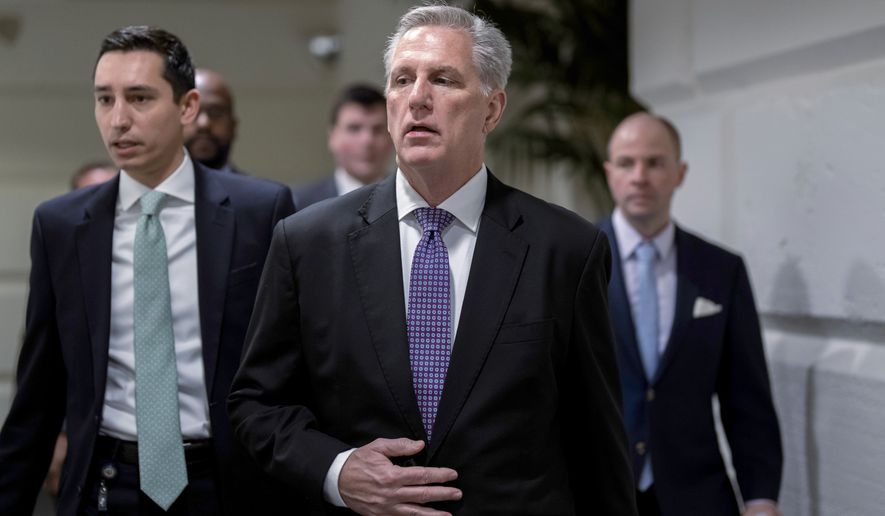The U.S. can’t legally default on its debt, but a failure by Congress to raise the cap on how much the federal government can borrow could spark a funding crisis for major programs.
Some Republican and Democratic lawmakers agree that the Constitution requires the federal government to honor its debt, which currently stands above $31.5 trillion. The requirement means that even if Congress refuses to raise the debt ceiling, incoming tax revenue will be used to pay the roughly $500 billion in annual interest owed to the nation’s creditors.
“There’s a reason why everyone says the debt ceiling is a bad hostage to take in budget negotiations,” said a centrist Republican lawmaker, who privately expressed reservations about the party’s stance on the debt ceiling. “If you’re taking a hostage, everyone needs to believe you’ll shoot the hostage if you don’t get what you want. We can’t really shoot the debt ceiling because the Constitution says you have to honor the debt.”
The government last week bumped up against the debt limit of $31.4 trillion, set by Congress in 2021. The Treasury Department is using tactics to keep paying the bills, but its maneuvering room will run out later this year, likely in the summer.
The federal government this fiscal year, which started on Oct. 1, has borrowed nearly 30 cents of every dollar spent. If it can’t borrow, it can spend only what it takes in, which means it will stop paying — or default — on some of its obligations.
At that point, it enters uncharted territory.
“Without raising the debt ceiling, the federal government would be obligated to keep paying interest on its debt and funding mandatory spending programs like Social Security and Medicare,” said David Ditch, a federal budget analyst at The Heritage Foundation. “But that leaves little money for other programs, including food stamps, unemployment benefits, tax credits, homeland security, among others.”
Other analysts say there is no way the Treasury Department could pick and choose which bills to pay. For one thing, the department says it doesn’t have the technical capabilities.
When Treasury faced a debt showdown in 2011, it pondered options such as selling assets, imposing across-the-board trims or prioritizing programs. Treasury officials concluded that the “least harmful” option was to delay all payments.

How that squares with the Constitution remains to be seen.
The 14th Amendment says “the validity of the public debt of the United States … shall not be questioned.” Some legal scholars say that amounts to a ban on defaulting and renders unconstitutional the whole exercise of Congress passing a debt ceiling.
Republicans say they don’t want to see a default, but they insist that any bill to raise the debt limit and allow more borrowing must be coupled with changes to bring down spending.
“We believe there ought to be specific, concrete limits on spending attached to a debt ceiling increase,” Rep. Chip Roy, a Texas Republican and member of the House Freedom Caucus, told The Washington Times.
Democrats counter that Congress has already spent the money and raising the debt limit is merely a recognition of that reality. They accused Republicans of threatening unthinkable spending cuts as their opening bid in debt talks.
“That’s not negotiation; that’s blackmail,” said House Minority Leader Hakeem Jeffries, New York Democrat. “What they’re essentially saying on the other side of the aisle is, ‘We will detonate Social Security, detonate Medicare, detonate veterans’ benefits or possibly even risk a catastrophic default for the first time in American history.’”
House Speaker Kevin McCarthy is scheduled to meet with President Biden on Wednesday to open negotiations over the debt limit.
Mr. McCarthy, California Republican, says cuts to entitlement spending such as Social Security, Medicare and Medicaid are off the table.
He said the rate of borrowing — the government will run trillion-dollar deficits every year over the next decade — is unsustainable and getting spending under control must be a top priority.
“We’re not going to default. But let me be very honest with you right now,” Mr. McCarthy said on CBS News. “[Default] won’t come to fruition until sometime in June. So the responsible thing to do is sit down like two adults and start having that discussion.”
Republican leaders have yet to publicize which cuts would be acceptable, but some conservatives have proposed capping federal spending at levels authorized by Mr. Biden’s 2022 budget.
Those spending levels are at least $130 billion lower than what Congress opted to appropriate in December when passing a $1.7 trillion measure to fund the government until the end of September.
Returning to 2022 levels of spending would slash even some Republican priorities. Defense spending, for example, grew 10% — from $782 billion in 2022 to $858 billion in 2023.
• Haris Alic can be reached at halic@washingtontimes.com.




Please read our comment policy before commenting.